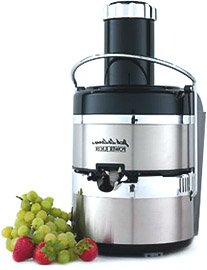 ECKraus,
ECKraus,
If a recipe calls for 4 or 5 pounds of pears for instance, will the amount of juice (run through a power juicer) be enough to make this recipe? Are there recipes available for someone wanting to use a power juicer? Thank you for any information.
Gary
__________
Dear Gary,
A power juicer can play a role in wine making, but a very limited one. The main issue is that the color and body of the resulting wine will be lacking. For this reason you will not find much, if any, information on learning how to make your own wine with a power juicer or power juicer wine recipes.
When making a red wine, whether it be from red grapes or red raspberries, the color and body comes mostly from the pulp and skin. These wines must be fermented along with the crushed pulp for several days for them to be red and have significant body. Without the pulp in the fermentation these wines would only be pink or blush in color.
Since the power juicer separates the pulp and skins from the juice, it is not a very good choice for making red wines. For red wines you are much better off using the traditional fruit crushers and grape presses.
Having said this, a power juicer would work when making white fruit wines. The pulp and skin are not needed when making these wines, so the power juicer may be of some value when learning how to make white wine.
My main concern when making these wines would be the speed of a power juicer. They are fast enough for making a few glasses of juice, but if you are needing 5 gallons of apple juice this would take some time.
Happy Wine Making
Customer Service at E. C. Kraus
———————————————————————————————————
Ed Kraus is a 3rd generation home brewer/winemaker and has been an owner of E. C. Kraus since 1999. He has been helping individuals make better wine and beer for over 25 years.

I bought a juicer just to try for a pear wine I wanted to make. I put the juice right into the must BUT I also added the pulp into the bag that also was added to the must as well. It’s coming along nice and is clearing up well to so I’ll be trying this on reds as well to see what result I get. Since I’m adding the pulp as well it should work just fine.
that’s why, after power juicing apples, you JOIN the juice with the dry pulp!
Then you let it ferment. Don’t wash the apples or other fruit, let the natural yeast that already sits on the unwashed fruit do the work.
I had best wine ever from wild berries. No yeast was added and they were not washed, so the natural berry yeast did the fermenting.
It was incredible.
I will now try to recreate this with apple and grape must.
I know this is an old thread. Hope folks are looking. Itried making wine for the first time last year. We used a juicer and had about 4 gallons of juice. The SG was 1.09. All turned ouy great and i want to try again this year. If the SG is that high with just the juice, is there a need to add more sugar at the start? If we want it to have a touch of sweetness rather than bone dry, can we stop fermentation early, or just add sugar at the end before bottling?
Ren, if the specific gravity reading is 1.090 with just the natural sugar, you do not need to add any additional sugar unless you desire a higher alcohol wine. A reading of 1.090 will produce approximately 12% alcohol. If you prefer a sweeter wine, you do need to let the fermentation complete and back-sweeten the wine at bottling time. Before you sweeten the wine, you need to add potassium sorbate/wine stabilizer to prevent re-fermentation of the newly added sugar. Below I have posted the links to a couple of articles that you may find helpful.
How To Stop A Fermentation
http://www.eckraus.com/blog/how-to-stop-a-wine-fermentation
Making Sweet Wines
http://www.eckraus.com/wine-making-sweet